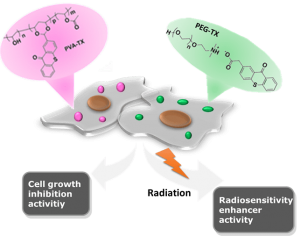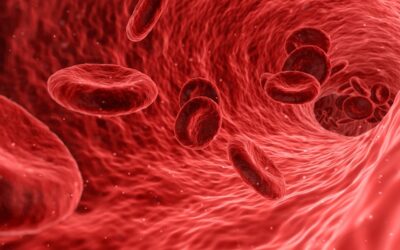Prof. Yagci and co-workers from the Istanbul Technical University have been actively researching photopolymerization processes and methods with the end goal of yielding systems which can be applied to solving relevant and challenging scientific problems.
In a recent work published in Macromolecular Rapid Communications, Yilmaz et al. successfully prepared polymeric thioxanthones, which were shown to be used as potential anticancer and radiotherapy agents.
Thioxanthone (TX) and its derivatives are industrially available photosensitive compounds used in various UV-curing technologies. When applied in conjunction with a co-initiator like amines, thiols, alcohols and ethers, they efficiently initiate photo-induced radical polymerization of vinyl monomers. Additionally, recent developments demonstrated the possibility of utilizing TX derivatives in bio-applications. When properly modified with hydrophilic substituents on the chemical structures, water soluble and bio-compatible TX analogs were found to display interesting bio-chemical features.
 In particular, employing thioxanthones as anticancer agents has recently been manifested as an outstanding additional property of this class of molecules. The reported study focuses on the utilization of polymeric TXs as potential anticancer and radiotherapy agents. For this purpose, TXs with appropriate functionalities were chemically attached to the side chains and end-chain of poly(vinyl alcohol) and poly(ethylene glycol). In this manner, water soluble, bio-compatible and stable TX-based polymers were obtained and their efficiency in targeting cancer cells was tested. The resulting radiosensitivity enhancer effect and cell growth inhibition activity of these special polymers make them valuable candidates as multipurpose pharmacotherapy agents in cancer treatment.
In particular, employing thioxanthones as anticancer agents has recently been manifested as an outstanding additional property of this class of molecules. The reported study focuses on the utilization of polymeric TXs as potential anticancer and radiotherapy agents. For this purpose, TXs with appropriate functionalities were chemically attached to the side chains and end-chain of poly(vinyl alcohol) and poly(ethylene glycol). In this manner, water soluble, bio-compatible and stable TX-based polymers were obtained and their efficiency in targeting cancer cells was tested. The resulting radiosensitivity enhancer effect and cell growth inhibition activity of these special polymers make them valuable candidates as multipurpose pharmacotherapy agents in cancer treatment.

















